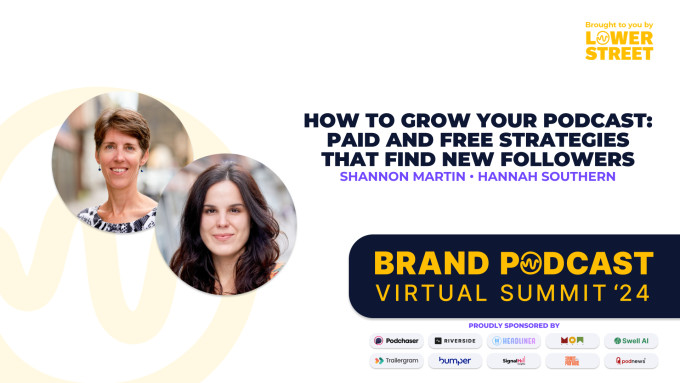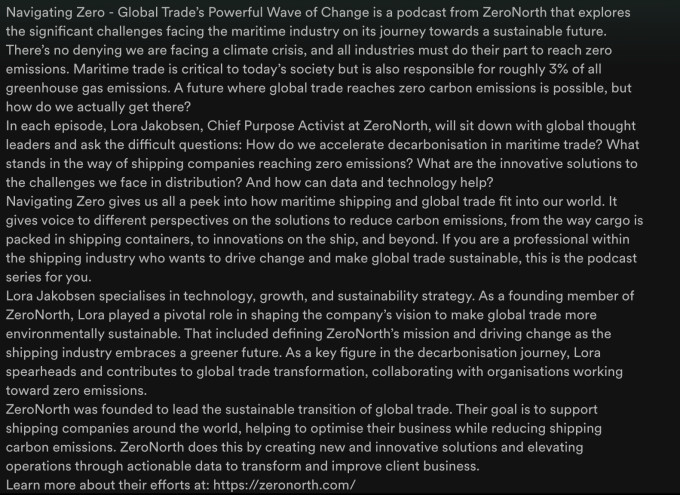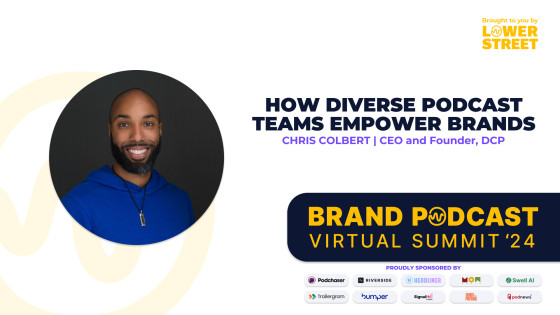How to Grow Your Podcast: Strategies for Success
Contents

The question every podcaster asks sooner or later: how can I grow my podcast and reach more of my target audience? It’s a common challenge, know you are not alone on the growth journey. While growth starts with strategy and creating great content, it’s also about getting it in front of the right people.
Following our popular session at the Brand Podcast Summit, we’ve decided to share our own team’s insights and strategies to help you improve your audience development strategy and start growing your podcast.
Lay the Foundation: Know Your Audience
Before diving into any type of promotional or marketing strategy, it's essential to lay the foundation for your podcast's growth. Understanding and defining your target listener is crucial, especially for branded shows, where you aim to reach a niche public.
You want to clarify your target audience: Who are they? What do they like? What are their challenges? Where, when, and why are they listening to podcasts?
But even more, you want to clarify your role regarding your listeners. Define the value you offer to them. What insights and solutions will your podcast give them?
Your podcast may have the same target audience as your brand, or it may be a sub-niche of that. Either way, you’ll also want to understand how your podcast can stand out.
Gather insights into what podcasts your potential listeners might already be tuning in to to understand their preferences, what’s worked well and not for others, and identify how to make your show stand out among the plethora of other podcasts.
Further Reading: Defining Your Ideal Podcast Listener
Growing with What You Have
Once you have clarified your audience, you can start looking into free and paid strategies for growth. One place to start is by analyzing what you already have at your disposal - the channels your brand already owns.
Take a look at how your content performs across different communication channels, and see where you can push your show. Engage your internal audience by incorporating the podcast into their learning and development, making it easily accessible for them to listen to.
Podcasts grow best by word-of-mouth, include your employees and network in the process, and they are likely to be enthusiastic and share the podcast with more people. You can enlist their help by asking them to review the show and engage with it to give the podcast a push upon launch.
Another way to share your podcast across channels you own is to make your podcast a tool for your business. Have sales and relationship management teams use it in their conversations with clients, spreading the word across a larger network. Create resources and cheat sheets for easy utilization of podcast content.
You can also repurpose content you have, either from resources and blogs into podcast episodes, or new podcast episodes into blogs, audiograms for social media, videos, and more.
Further Reading: How to Repurpose Your Content and Why
Increase Discoverability- Implement SEO
The power of podcast descriptions and web optimization is so often overlooked, but it is a powerful tool for growth. Podcast SEO is crucial for making your show more discoverable, on the web and also on platforms like Apple and Spotify.
It’s a great idea to have a landing page dedicated to your podcast, and blog posts dedicated to each episode. A good SEO-optimized blog post for each episode is the “gold standard” for web discoverability. Transcripts are helpful for accessibility and can be a tool for SEO, but a well-organized blog post will ultimately do the most for your positioning on Google. Remember, though people mainly listen to podcasts in apps, they might discover your podcast when doing a Google search for related topics.

Along with web SEO, you can also optimize your show descriptions and titles on podcast apps to match popular search queries.
Make sure to use all the space you can in the descriptions. Choose 5-10 keywords to focus on that are relevant to your show, brand, and audience. The best rule of thumb is to choose 5 words that fully encompass what your show is about (sustainability, maritime trade, shipping, climate crisis, and zero emissions for example can be highlighted in the podcast description above.) Then fit them in often, but naturally, to your show and episode description. It’s also a good idea to have a small host bio and links in each text.
Grow on New Platforms - Experiment with Video
Video podcasting is on the rise. YouTube was the most-used podcast platform in 2023, with 28% of weekly podcast listeners choosing YouTube as their primary listening platform. It also helped listeners discover new podcasts, with 65% of individuals who watched a podcast on YouTube listening in for the first time. Considering video as a discoverability tool, 55% of TikTok users, use the app to discover new things.
Use this trend and a video strategy to expand your podcast's reach. You can use YouTube to upload full episodes, share key clips, and engage with your audience through video content. Experiment with different platforms such as TikTok to discover new potential listeners. Wherever you choose to go, make sure it’s somewhere you will find your audience. By defining their interests and habits early on, you’ll know if they are more of a YouTube, TikTok, or Instagram crowd, and where it’s most worthwhile to spend your effort.
Further Reading: Video Podcast: What is it, How to Get Started and Why?
Engage Your Audience
Returning to the idea that word-of-mouth as the best source of podcast growth, you’ll want to connect and engage with your audience as much as possible. In this way, they’ll be even more excited to sing the show’s praises.
You can connect with your listeners through Q&A sessions, polls, and guest sharing to create a sense of community around your show. Consider running competitions to boost engagement and encourage people to subscribe.
You may think about starting a newsletter to complement your podcast. Newsletters can be a powerful tool to keep your audience engaged and excited about new content. They provide an excellent opportunity to share behind-the-scenes information about upcoming episodes and offer exclusive content to your most loyal fans.
A newsletter can be used both to engage further with current listeners or to reach new ones out of an interested audience. Create an easy signup module to attach to current blogs or your main landing pages. If you can, provide an offer to entice users to leave their email: this can be a discount on your product or exclusive content.
From there you can start nurturing relations and spreading the word about your podcast.
Marketing Strategies - Beyond Owned Content
When you’re ready to invest in marketing and promotion, you can focus on either paid ads or effective PR approaches. If you are looking for the most growth, it’s best to aim for a blend and cover all your bases.
When investing in paid promotion, ads often work best in locations where individuals are already in looking to consume podcasts. In this case, good places to start are podcast apps, audio ads, and programmatic ads to reach potential new listeners effectively. But always keep your audience in mind, and aim for where you know they will be.
Earn media opportunities by reaching out to industry-related newsletters, and podcast listening apps, and considering feed swaps for cross-promotion. Identifying key guests for your show to help spread the word, or do a cross-promotion can be a great idea for growth.
Further Reading: How & Where to Advertise Your Podcast
How to Measure Your Success
Unlike advertising or promotional marketing campaigns, podcasting success should be measured more holistically. Each podcast’s success will depend on the objectives set. Podcasts are a popular medium to help grow thought leadership or brand awareness. Some teams may aim for recognition in the podcasting world through awards and placements on top charts. You might be most concerned about lead generation or account-based marketing goals, which might come through both guests and listeners.
Overall, you should focus on how your target audience is interacting with your podcast, and therefore, your brand.
Base metrics to keep an eye on for audience size and growth include downloads and listener numbers. But, to understand your podcast’s reach and influence more, you’ll want to also measure audience engagement through metrics like consumption rate and time listened. It’s better to have a small, but highly engaged and loyal audience, than a large, but quite disengaged one. This is especially true for brands trying to reach a particular niche or with high-value products or services where even one big opportunity or strengthened relationship could create significant ROI.
Additionally, you’ll want to focus on brand wins, such as collaborations and features, to assess overall podcast success. Did your podcast elevate your brand by winning awards or creating buzz by being featured in the media? Was your host asked to speak at an industry event on the back of the podcast? Did the podcast hit the tops of the charts and get a lot of attention for your thought leadership?
Conclusion
By implementing a blend of owned, free, and paid strategies you'll be better equipped to grow your podcast and attract a larger audience. Building a strong foundation, optimizing discoverability, and engaging your audience, and effectively measuring your success are all key to achieving sustainable growth in the competitive podcasting landscape. Remember, consistency and strategic marketing efforts will play a significant role in achieving your podcasting goals.
Contact our team and let us help you optimize your growth strategy.
If you’d like to catch our next live events on growth, check out our upcoming events.
Thinking about launching a podcast for your brand?
If you need a hand launching, producing, or promoting your branded podcast, the Lower Street team is here to help. Get in touch for a free consultation.contact us today to get started.
Contact us




